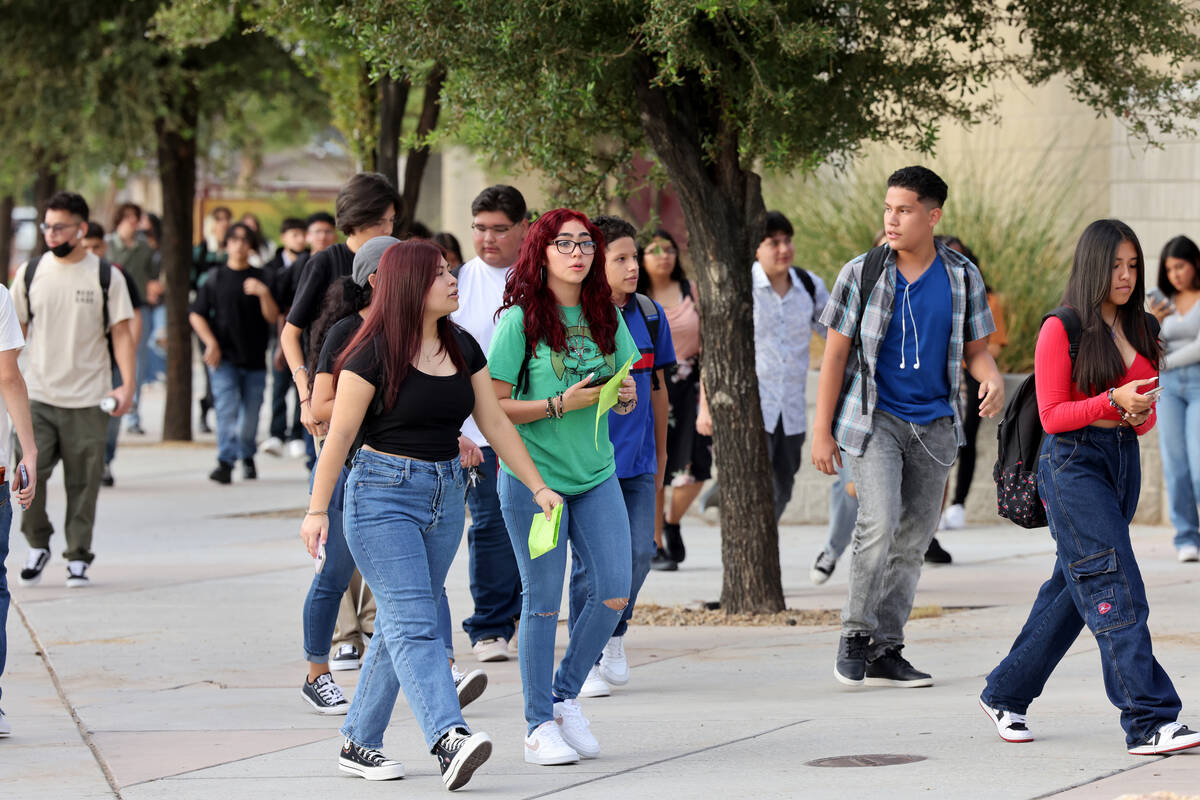Nevada high school students may get the option of sleeping in
Members of the Nevada State Board of Education expressed support Thursday for looking into options for later high school start times.
The board discussed the possibility of implementing regulations but took no action.
Research has proven that later start times lead to better student outcomes, Board President Felicia Ortiz said.
At the end of the discussion, Ortiz said a relevant next step could be holding a workshop to come up with ideas.
The board wants to hear from families about what their priorities are and what’s important for their children, she said. “We want to make this a community effort.”
Many Clark County School District high schools begin classes at 7 a.m., which has drawn concerns from students and parents.
And in California, a law recently went into effect — the first of its kind in the nation — saying that high schools can’t begin earlier than 8:30 a.m. and middle schools can’t start before 8 a.m.
Board Vice President Mark Newburn said he hopes the conversation can be used as an opportunity to innovate and look at what choices they could give to families.
The state doesn’t have to look at one start time for every student in the system or solve the problem for everyone right away, but should strive to have some early victories and build local evidence, Newburn said.
“If we can do something for some kids, it’s a win,” he said.
Board member Katherine Dockweiler — a school psychologist — said research about later start times shows not only academic benefits, but a decrease in violence and behavioral incidents on campuses, thereby improving school safety.
She said that could improve working conditions for employees as well.
Potential impact in Clark County
The board’s student representative Malia Poblete, a junior at Durango High School in Las Vegas, said she starts school at 7 a.m., so she’s up at 5:30 a.m.
She said that she’s just one student but she has talked with peers across the state who are experiencing the same thing.
It would be ideal to have a later start time, Poblete said, noting that starting at 8 a.m., for instance, would give her an extra hour of sleep.
Poblete said she’s also a member of Durango’s school organizational team and the team recently looked at data on absentee rates.
A lot of absences are during first- and second-period classes, she said, noting students are most likely sleeping or their parents aren’t available to take care of younger siblings, so they’re filling that role.
Clark County School District Superintendent Jesus Jara told the board that the topic of later high school start times is a great community discussion and the research is “very clear.”
Barriers include transportation and food service regulations, he said. There’s also the question of “who comes earlier and who stays late.”
The school district began last school year with about 250 school bus driver vacancies, Jara said. After raising pay, it now has fewer than 80.
The district also partnered with the Regional Transportation Commission of Southern Nevada to have students at some high schools take city buses instead of district-provided transportation.
Rural superintendents weigh in
The board’s superintendent representative, Summer Stephens of the Churchill County School District in Fallon, said that if there’s a regulation, it should speak to flexibility and options.
In rural communities, she said, there are students who ride buses for an hour or more and many children are doing activities that continue into the evening hours.
But she said she doesn’t want adult concerns to put a damper on the opportunity to do “what we know is best for kids.”
Adam Young, superintendent of White Pine County School District in Ely, said his district is on a four-day school week. Classes begin around 8 a.m. and dismiss close to 4 p.m.
Young said that there isn’t resistance to starting later in the day, but added that “transportation is a huge, huge barrier” and noted that it’s a challenge hiring drivers.
Another challenge is there’s only one high school gymnasium in his district. If the start time is later than 8 a.m., it would affect when students could use the facility for extracurricular activities and “it makes for some late nights for kids to be on campus as well,” he said.
Public comments
During a public comment period, Ed Gonzalez — a community member on Hickey Elementary’s school organizational team in Las Vegas — said the state Legislature considered bills in 2017 to require later school start times.
In a written public comment — which was read by staff during the meeting — Tiffany Thomas said her son attends Green Valley High School in Henderson, where there’s a 7 a.m. start time.
Thomas said her son isn’t getting enough sleep and is consistently tired.
An 8 a.m. start time or later would allow students to get the rest they need, she said.
In a written public comment, policy expert and mother Nancy Brune — also a newly inaugurated Las Vegas city councilwoman — expressed support for later school start times, saying the conversation is long overdue and a timely topic.
Contact Julie Wootton-Greener at jgreener@reviewjournal.com or 702-387-2921. Follow @julieswootton on Twitter.


















